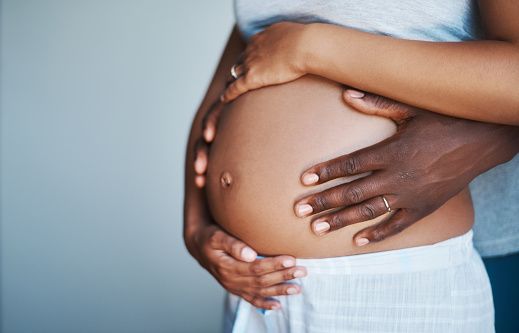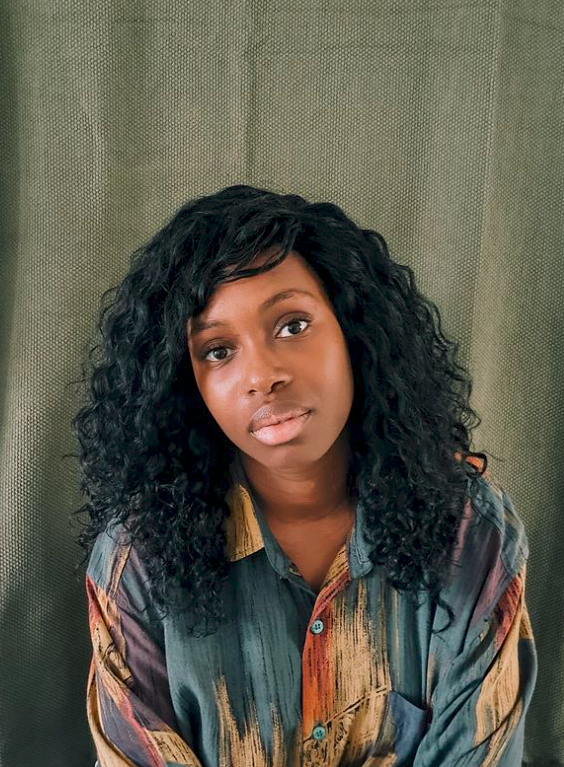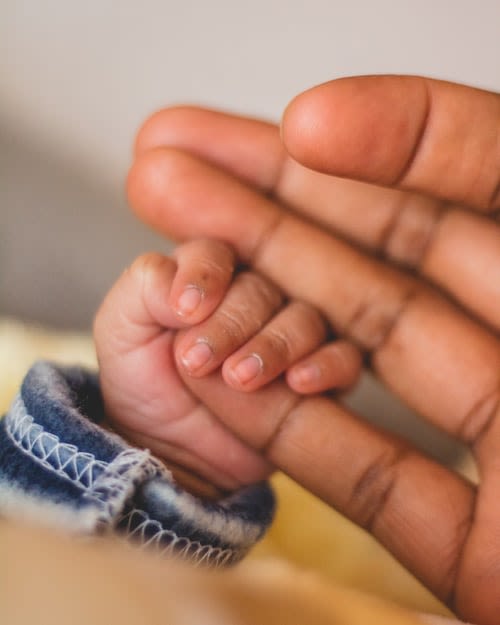"A system that is not built for people that look like us."
Is the high rate of loss in BAME pregnancies in the UK being properly addressed?

In early 2019, when she was 22 weeks and six days pregnant, 28-year-old Zainab Omokhe from East London, suffered a miscarriage. Throughout the first five months of her pregnancy, there were no clear signs that she would lose her daughter. It was only after her five-month scan that the sonographer noticed that something could be wrong.
"This weird overwhelming feeling of immense fear."
Mrs Omokhe, accompanied by her husband Junior Omokhe, went for a second scan with a senior sonographer. They were told that the blood flow to their daughter was strained, the placenta was small, and she wasn't growing very well.
After this follow up scan, Mrs Omokhe was put on aspirin. She went home and carried on as normal. She was struggling to process the possibility of losing her baby because, as far as she was concerned, up until the five month scan, everything was fine.
Two weeks later, the expectant mother and father attended an appointment where they were given the heart-breaking news. Their daughter had died in the womb.
Mrs Omokhe said: "I remember being very afraid, just not knowing what would happen and just having this weird overwhelming feeling of immense fear."
"Hearing the cries of living, happy, healthy babies."
Over the next few days, Mrs Omokhe was being prepared to give birth. She was given induction tablets, which was a painful experience for her.
She said: "I was on a ward with people who were going home with their babies and I found that really difficult, hearing the cries of living, happy, healthy babies."
When her daughter was born, Mrs Omokhe held her for about ten minutes. She recalled how weird it felt, so she and her husband got the midwife to take her away. This is something she now sometimes regrets.
"It made me feel really comfortable that my consultant was a Black woman."
Not long after the loss of her daughter, in May 2019, Mrs Omokhe found out she was pregnant again. During this pregnancy, which brought her and her husband their two-year-old son, she was very grateful of the fact that she had a Black woman as her consultant.
Mrs Omokhe said: "It made me feel really comfortable that my consultant was a Black woman. For me I felt really comfortable talking to her, being annoying and saying I wanted to see her all the time."
Having that representation and familiarity was something that was very important to Mrs Omokhe in an already high anxiety situation. It helped her to not worry about being a nuisance, and really possitively shaped her experience of being pregnant, she said.
Mrs Omokhe expressed how important it is for care to be consistent across all hospitals and medical centres, especially for ethnic minorities.
The young mum is now a media volunteer for The Miscarriage Association and part of a consultation for women who have suffered miscarriages in the second trimester. She also uses her social media platform to raise awareness of miscarriages and support those struggling through losses of their own.



The systemic problem
How mainstream healthcare and research is failing BAME birth-givers and their babies.

In the UK, ethnic minorities face worse outcomes than their white counterparts within pregnancy and early motherhood.
The neonatal mortality rate for Asian babies is 66% higher than for white babies. Black mothers are 43% more likely to experience a miscarriage. The maternal mortality rate for Asian mothers is almost double the rate for white mothers. And the maternal mortality rate for Black mothers is more than four times the rate of white mothers.
In 2022, research into why this is the case still remains white-washed and many prevalent issues in healthcare are unaddressed according to midwife, Benash Nazmeen.
Benash Nazmeen is a 'midwife first and foremost'. She currently teaches midwifery at the University of Nottingham and is the director and co-founder of the Association of South Asian Midwives. Ms Nazmeen is the chair of The Sheffield Maternity Cooperative, in which she leads the Community of Cultures initiative. This specifically supports black and brown women and birthing people in a culturally sensitive way.
"A system that is not built for people that look like us."
Ms Nazmeen outlined that poor outcomes in maternity care are down to racism in employment, the education gap, the stress of unemployment that many face, poor mental health and poor access to the services they need.
She stressed that: "It's the fact there's an intersectionality of a wide range of factors that is perpetuated by societal discrimination and it exists before we even arrive into a system which is not built for people that look like us."
Ms Nazmeen highlighted that all of these external stresses can have negative physical effects on the body including higher blood pressure, increased chance of obesity and diabetes, as a result of a poor diet than may accompany living on the poverty line.
Of course, many of these factors do not apply to women like Mrs Omokhe. But they are the reality for many ethnic minorities in this country. This is why healthcare professionals like Ms Nazmeen promote de-medicalisation of birth.
"The white man was doing the research."
The midwife emphasised that the elitist nature of academia contributes to problem of minority ethnic groups facing poor outcomes within all areas of healthcare, not just maternity care.
Ms Nazmeen exclaimed: "It's a perpetual cycle and as healthcare professionals, being aware and understanding this, understanding the fact that we are being taught in a Eurocentric lens, when we go to university, we’re being taught to take care of a fair bodied person."
She continued: "The white man was doing the research and the white man was focusing on things that he thought were important.
"Do we always need more research and data, yes. But who’s doing the research? Who’s advising them? What are their stakeholders? Are they representative?"
